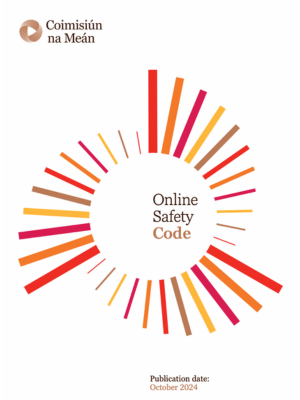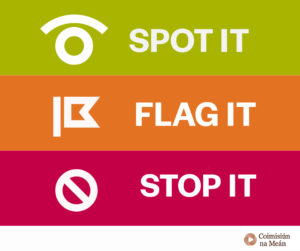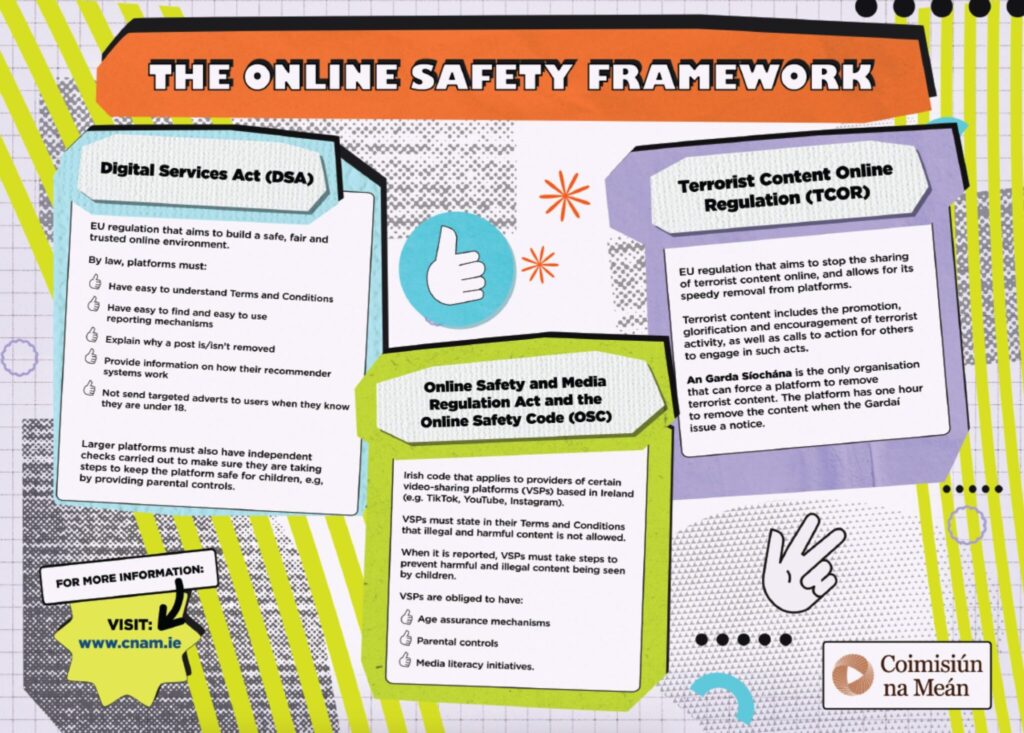Explained: What is the Online Safety Code?
What is the Online Safety Code?
Coimisiún na Meán’s Online Safety Code sets out new binding rules that oblige video-sharing platforms to make changes to their services to ensure that users, especially children, are protected from illegal and harmful content. The Online Safety Code applies to video-sharing platform that are based in Ireland, and it is one element of Ireland’s Online Safety Framework, which also includes the EU Digital Services Act, and the EU Terrorist Content Online Regulation.
What does the Online Safety Code do?
It means that these platforms must put in place measures to prevent the uploading and sharing of harmful content including:
- cyberbullying, content promoting self-harm or suicide and promoting eating or feeding disorders as well as incitement to hatred or violence, terrorism, child sex abuse material, racism and xenophobia.
- They must use age assurance to prevent children from encountering pornography or gratuitous violence online and have age verification measures in place as appropriate.
- Provide parental controls for content which may impair the physical, mental, or moral development of children under 16.
- Provide transparent, user friendly, and effective Reporting, Flagging and Complaints mechanisms.

What platforms does the Online Safety Code apply to?
The Online Safety Code applies to video-sharing platforms that have their EU headquarters in Ireland. This includes Facebook, Instagram, LinkedIn, Pinterest, TikTok, Tumblr, Udemy, X, and YouTube.
What about other services?
All types of illegal content on other online services are covered under the EU Digital Services Act, and Coimisiún na Meán is responsible for enforcing the DSA in Ireland. The Online Safety Code is one element of Ireland’s Online Safety Framework, which is designed to protect users, especially children, from harmful and illegal content online. The framework is built on three key pieces of legislation: the Online Safety and Media Regulation Act 2022 the basis for the Online Safety Code, the EU Digital Services Act, and the EU Terrorist Content Online Regulation.
What do children and parents need to know?
It means that there are now more rules requiring online platforms to protect children and adults rights online. Online platforms must protect people, especially children, from being harmed by their experience online. Under the Online Safety Code video-sharing platforms are obliged to put measures in place to protect children from harmful content, have age assurance/verification measures where appropriate, provide parental controls, and provide user-friendly and transparent reporting and flagging mechanisms.
What can you do if you or your child finds that a platform has broken the rules?

Spot it. Flag it. Stop it.
Report it to the platform first. Under the Online Safety Code, the platforms must provide transparent and user-friendly reporting and flagging mechanisms. If you need help with this or want more information on how to report visit the Coimisiún na Meán complaints guidance page.
Educational Resources

Coimisiún na Meán have created educational resources for parents, students, and teachers about children’s rights online under the Online Safety Framework.
More information about Coimisiún na Meán’s Online Safety Code
Webwise Parents Hub
The Webwise Parents Hub is also a useful resource for parents/guardians to help you support your child online. It provides advice from experts on key online safety topics, Explainer Guides to popular apps and platforms, Talking Points, How-To Guides and free resources.





